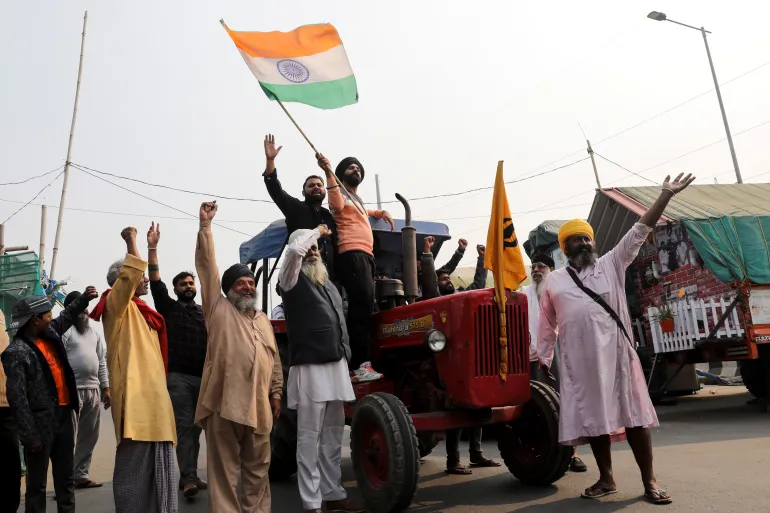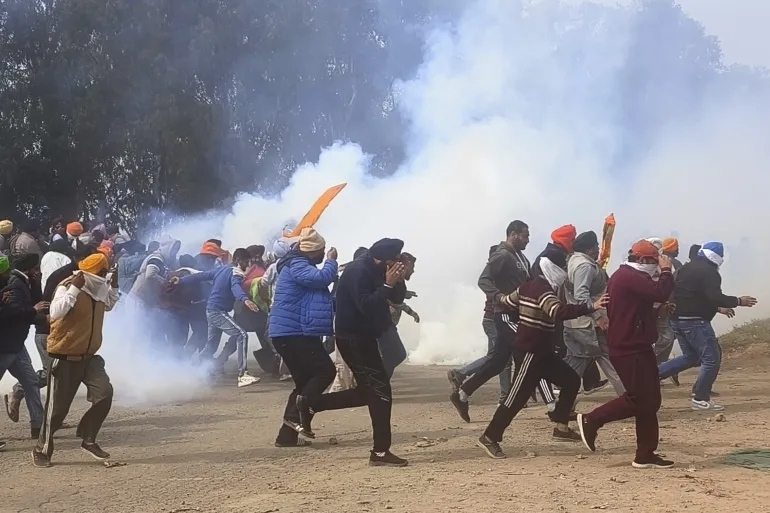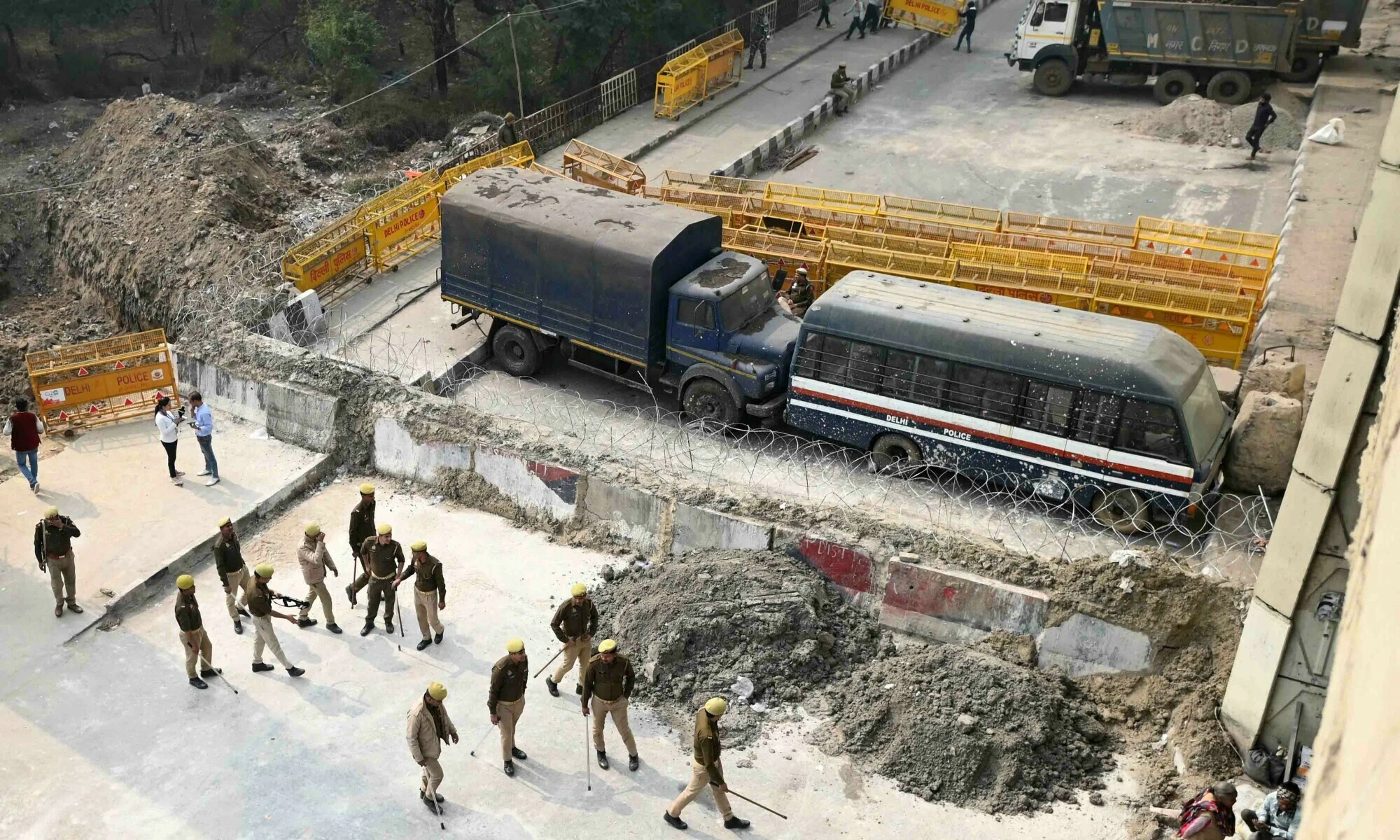At heart of India’s rural belts, a substantial movement has resurfaced that symbolizes the struggle and resilience of the Indian farmers. The ‘Chalo Delhi’ march, organized by farmers from Punjab, Haryana, and Uttar Pradesh, represents a watershed moment in the country’s agricultural discourse. This dissenting demonstration comes after a series of fruitless negotiations with Union Government officials, highlighting the agricultural community’s great discontent.
The key element of Indian farmers’ demands—a legal guarantee of Minimum Support Prices (MSP) for crops—casts a lengthy shadow over the negotiations, demonstrating a gap between Government’s pledge and farmers’ expectations.
The protests are not isolated events but a continuation of a longstanding dispute, which see agricultural sector grappling with uncertainty and adversity. Revocation of the controversial Farm Laws in 2021, after a year of intense protests, was a landmark moment; however, it did not signify the end of the farmers’ grievances. Their demands have since evolved, focusing on the implementation of the Swaminathan Commission’s recommendations, a comprehensive farm debt waiver, and a legal framework ensuring MSP, which farmers argue is vital for safeguarding their livelihoods against market volatility.

The Indian Government, represented by Union Agriculture Minister Arjun Munda and Food and Consumer Affairs Minister Piyush Goyal, claims to have reached an agreement on the majority of concerns. However, the farming community is still skeptical about the formation of a committee to further investigate outstanding issues, motivating them to continue their march to Delhi. In preparation for the demonstration, the Government has implemented substantial security measures, including massive Police deployment and rigorous border controls, expressing concerns about potential disruption and unrest.
The ‘Chalo Delhi’ march is emblematic of a larger struggle within India’s agrarian sector, where farmers seek not just economic safeguards but also respect and recognition of their rights.
The agitation brings to the forefront the critical question of how a nation balances the diverse needs of its population with the imperatives of modernization and economic development. Moreover, it highlights the complexities of governing a demographically and economically diverse society, where policies often have uneven impacts across different communities.
Also Read: From Republic to Hindu Rashtra: The Erosion of Secularism in Modi’s India
Punjab, known as the “Granary of India,” plays an important role in guaranteeing India’s food security by considerably contributing to national wheat and rice production. This state, which covers less than 1.5% of India’s land area, produces 17-20% of the country’s wheat and 10-12% of its rice, thanks to extremely high crop yields—averaging roughly 4,000 to 5,000 kg per hectare for wheat, significantly higher than the national average. The legacy of the Green Revolution of the 1960s and 1970s, which introduced modern farming techniques, high-yielding seeds, and expanded use of fertilizers and irrigation, continues to resonate in Punjab’s agriculture. With almost 98% of its cultivable area under assured irrigation, compared to the national average of roughly 35%, Punjab has one of the most developed irrigation infrastructures of India. However, the state’s agriculture faces the problem of diversification, with ongoing efforts to incorporate crops like maize, pulses, and vegetables to assure sustainability and solve challenges such as groundwater depletion and soil degradation.
Police in Delhi have sealed the borders on three sides of the city, in an attempt to avoid a repeat of 2020, when protesting Indian farmers hunkered down for months, blocking national highways that connect the capital to its neighbouring states. The movement was seen as one of the biggest challenges to Prime Minister Narendra Modi’s Government.

The use of tear gas through drones against farmers during their ongoing march towards Delhi has become a focal point of contention and a symbol of the escalating confrontation between the protestors and the government. Police response to the peaceful protests has sparked widespread criticism and concerns from various quarters of society on social media.
The farmers’ dissatisfaction with the Indian Government has been heightened by situations in which they felt their voices were not heard, notably during discussions about agricultural reforms and policies that directly affect their livelihoods.
The Sikh farming community, particularly in Punjab, has long been at the heart of India’s agricultural prosperity, contributing greatly to the country’s grain stockpiles. Despite their achievements, Sikh farmers have expressed worries about feeling excluded and ignored by laws that they believe do not effectively meet their needs or protect their rights. Highlighting Sikh farmers’ concerns in this setting brings to light the larger problem of minority rights and representation in India’s democratic process.
Also Read: The Nightmare of Minorities in Modi’s India
These protests coupled with road blockages, if prolonged, will have serious consequences for both the agricultural industry and the Indian Government. Supply chain interruptions may prohibit the shipment of product and agricultural inputs, influencing market access, pricing, and potentially spoiling perishable items. These delays and blockages may also occur during important sowing or harvesting periods, impacting agricultural production and output. On the law and order front, these protests require major law enforcement resources, perhaps diverting focus away from other public safety concerns. Economic strain induced by disturbances in the agricultural sector may lead to greater desperation and, possibly, criminal activity, posing further challenges to law enforcement. Public sentiment may become polarized, leading to social fabric strains and confrontations between different societal groups. The cumulative effect of these protests, therefore, hinges on their duration, the Government’s policy responses, and the stakeholders’ ability to engage in constructive dialogue, presenting a complex scenario that affects both India’s agrarian economy and its societal order.
As the march progresses in Delhi, it serves as a sharp reminder of the continued struggle that many people in India’s rural areas face.
The path to resolution lies in acknowledging the legitimacy of the Indian farmers’ demands, understanding the socioeconomic dynamics at work, and developing policies that are inclusive, equitable, and forward-looking; however, this is not the case with the way the BJP government is handling the situation, which has PM Modi’s approval. This campaign is about more than simply economic promises; it is also about dignity, respect, and a fair share of India’s future.
The protest in India is a testament to the enduring spirit of its agrarian community, facing the dual challenges of modernization and preservation of traditional livelihoods. As the nation watches the ‘Chalo Delhi’ march unfold, it is reminded of the essential role that farmers play in the fabric of Indian society and the importance of ensuring that their voices are heard and their concerns addressed.
The opinions shared in this article reflect the author’s personal views and do not necessarily align with the institution’s official stance.
Sehr Rushmeen, an Islamabad based freelance researcher, did her MPhil from National Defence University (NDU) in Strategic Studies, and her BSc from University of London (UOL) in International Relations. Her area of research interest is Strategic Nuclear Studies, Artificial Intelligence in Warfare, South China Sea and South Asian Politics. She tweets as @rushmeentweets and can be reached on sehrrushmeenwrites@gmail.com.



![Pakistan's counter-terrorism efforts against terrorism is a story of resilience and unwavering resolve [Al Jazeera]](https://policy-wire.com/wp-content/uploads/2024/04/201453183850178580_20-300x181.webp)
